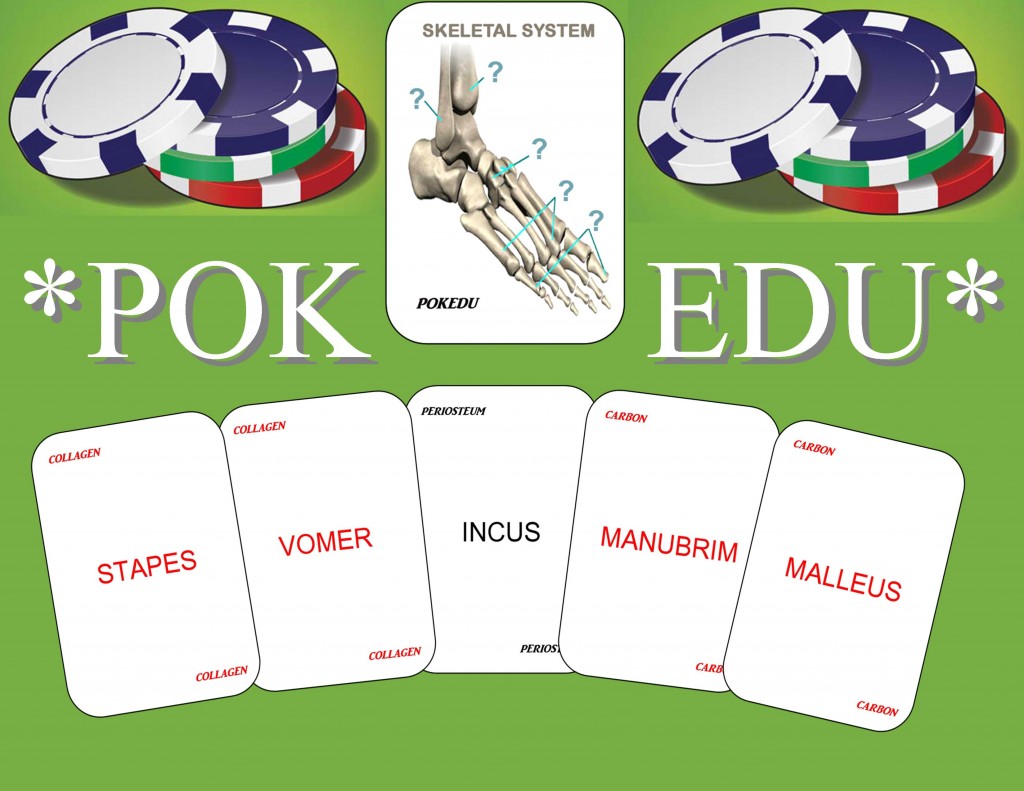This Op-Ed is by Kevin Wince, CEO of POKEDU Games
POKEDU is a gaming method involving poker card decks which utilize a concordance of facts within the four suits to complete poker styled hands. Standard shared and draw poker games (i.e. Texas Hold’em and 5 & 7 Card Draw) can be played using these decks; as well as many other popular youth and family games.
Any subject matter can be implemented within this format; and there are also card decks which use a sequential ordering of facts (i.e. the order of the presidents, periodic table of elements, or the books of the Bible, etc.) divided amongst suits with which players can play games such as ‘Spades’, Gin or ‘Bidwist’. POKEDU games can be played using standard poker bidding rules (utilizing poker chips), the ‘Scholastic Scoring System’ (specially designed for POKEDU), or standard gaming rules.
POKEDU is intended to serve many functions, with the primary being to take existing popular past-times and add an interactive educational, trivia, learning, teaching or testing perspective to it in order to increase the excitement and value of the game; whether for home & tailgating fun, tournament play or education (2 hours of game-play is equivalent to 2 hours of studying the subject matter… win or lose).
In a classroom setting, it provides more teacher to student and student to student interaction involving a comprehensive understanding of the subject matter, as well as the critical thinking required to win at card games. Playing these games draw heavily upon an individual’s desire to compete, and win, in order to encourage them to learn, retain and manipulate subject matter. For the poker styled games, it is a cross between ‘Champions of Poker’ and ‘Jeopardy.’ When playing POKEDU you are not only playing against your opponent’s hand, but also against their knowledge of the subject matter that the game is based around. POKEDU requires critical thinking and risk assessment skills as well as learning and memory skills
While currently proving itself as an innovative tool in primary, secondary and tertiary classrooms, provoking excitement in competitive learning, POKEDU has also proven to be a useful tool in brand-building for corporations. Currently, branded games have been developed for the APEX Black History Museum, STAX Museum of American Soul Music, STAX Charter School 6 – 12, and the National Civil Rights Museum to name a few; as well as Youth Education (Sex Ed.) for use in ILP of Foster Care Programs. Through the gameplay itself, these companies have been able to thoroughly educate on the content, purpose, necessity and historical value of their existence; while leaving a lasting and continual impression on what would traditionally be ‘one-time visitors’.
POKEDU plans to eventually leverage gaming technology to provide an educational user experience that will encompass all the benefits of online gaming, including: ease of setup, portability, artificial intelligence (computer players), gamification, and an online community environment.
Who says you can’t have a good hand with educational games? You can learn more about POKEDU and inquire about them at their developer site at http://www.whitesunrise.com/










“Through the gameplay itself, these companies have been able to thoroughly educate on the content, purpose, necessity and historical value of their existence; while leaving a lasting and continual impression on what would traditionally be ‘one-time visitors’.” I’m confused, I guess. There’s also some dissonance in attempting to meld gaming/poker with education, although the “casinos for education” rationale has worked here in the US!
Many museums have educational materials which are provided in advance of school field trips, in order to provide students with relevant information regarding the exhibits that they will see. Additionally, via game-play, the exhibits visited while at a museum will not only remain with the visitor, the visitor will also spread the relevance of the museum each time they play the game within their own community. As far as melding gaming/poker with education; it is already accepted not only within educational arenas (it is now a curicullum with Ivy League Colleges, and most universities have an accepted Poker Society), and it has been accepted as a pilot program within several YDCs. The key is that it is a tool to reach people where they exist, in order to encourage them to learn;especially where the traditional styles of lecturing have failed.